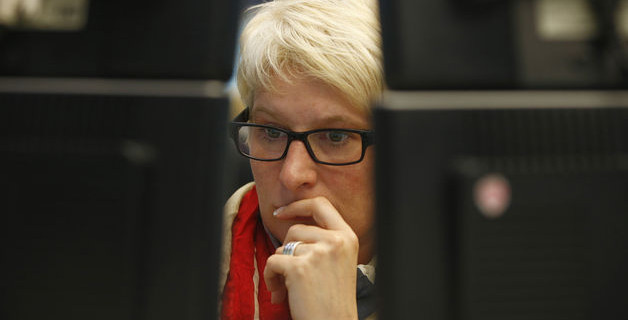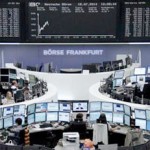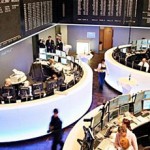U.S. Stocks Fluctuate While Europe Slumps on Ukraine

U.S. stocks fluctuated as an index of manufacturing slowed while European shares snapped two days of gains amid concern the Ukraine crisis may escalate. The yen and gold weakened.
The Standard & Poor’s 500 Index fell less than 0.1 percent to 1,865.73 at 9:51 a.m. in New York, after jumping the most in a month last week. The Stoxx Europe 600 Index lost 0.4 percent as world leaders gathered in The Hague. The yen dropped against most of its major counterparts and Russia’s ruble strengthened against the dollar. Yields on 10-year Treasury bonds gained for the first time in three days. Gold fell 1.4 percent.
U.S. President Barack Obama arrived in Europe for talks as Russia, which completed its annexation of Crimea last week, masses soldiers on the border with Ukraine. Data today showed U.S. manufacturing activity slowed this month, while other reports showed China’s manufacturing industry weakened in March and growth at euro-area factories and service providers held close to the fastest. China’s leaders have pledged to accelerate policies to support the world’s second-largest economy and manufacturing data today missed economists’ expectations.
The S&P 500 rose 1.4 percent last week as data from jobless claims to manufacturing showed the economy is strengthening after unusually harsh winter weather. The benchmark index reached an intraday record on March 21, touching 1,883.97 before retreating. Reports on housing, gross domestic product and durable goods are among the economic data due this week.
Manufacturing Data
The Markit Economics preliminary index of U.S. manufacturing decreased to 55.5 in March from 57.1 a month earlier, the London-based group said today. A reading above 50 indicates expansion. This month’s reading was the second-highest since January 2013. The median forecast in a Bloomberg survey of 19 economists was 56.5, with estimates ranging from 54 to 58.
The Chicago Fed’s national index rose to 0.14 in February versus a forecast of 0.1 in a Bloomberg forecast. It was revised to minus 0.45 in January from minus 0.39.
The bull market in U.S. equities this month entered its sixth year, after the S&P 500 surged as much as 178 percent from its 2009 low, as three rounds of bond purchases from the Federal Reserve helped fuel economic growth in the past 11 quarters.
Fed Chair Janet Yellen said on March 19 that the central bank’s stimulus program could end this fall and benchmark interest rates may rise about six months later. The Fed had previously said it would not raise rates for a considerable period, without specifying a time frame.
Yields on Treasury 10-year notes rose three basis points to 2.77 percent before the U.S. sells $96 billion of fixed-rate notes this week.
Europe Stocks
The Stoxx 600 dropped after it jumped 1.8 percent last week. The number of shares changing hands in Stoxx 600-listed companies was 21 percent lower than the 30-day average for the time of day, according to data compiled by Bloomberg.
Royal KPN NV lost 3.3 percent after Citigroup Inc. downgraded the Dutch telecommunications operator. Deutsche Post AG rose 2.9 percent after a Welt am Sonntag report said Europe’s largest postal service will increase its mail profit target by 60 percent.
Growth in euro-area manufacturing and services stayed close to the fastest since 2011 in March as France strengthened, providing further evidence the region’s recovery is on track. Indexes for manufacturing and services based on surveys of purchasing managers were little changed from February, London-based Markit Economics Ltd. said in a statement.
War Risk
Ukraine’s foreign minister said the risk of war was growing amid calls from U.S. lawmakers for more Western support for the Kiev government. U.S. officials said Russian troops are massed along virtually the entire Ukrainian border and have about doubled in number from when Moscow’s defense ministry first announced military exercises.
Russia’s Micex (INDEXCF) Index fell 0.3 percent, reversing an earlier gain. The ruble advanced 0.4 percent against the dollar.
China’s manufacturing industry weakened for a fifth straight month, according to a preliminary measure for March released today, deepening concern the nation will miss its 7.5 percent growth target this year. The preliminary purchasing managers’ index from HSBC Holdings Plc and Markit Economics was at 48.1, below the 48.7 median estimate of 22 economists surveyed by Bloomberg.
Chinese stocks rebounded from initial losses on speculation that weakening growth will prompt policy makers to reconsider their aversion to broad stimulus measures. “We expect Beijing to launch a series of policy measures to stabilize growth,” Qu Hongbin, Hong Kong-based chief China economist at HSBC, said in a statement.
The MSCI Emerging Markets Index rose for a second day, climbing 1 percent.
Gold fell 1.4 percent to $1,317.80 an ounce. U.K. natural gas, the European Union’s benchmark contract, dropped for a sixth day, declining 1.3 percent to as low as 54.55 pence a therm on forecasts for warmer-than-normal weather. Europe gets about a third of its natural gas from Russia, half of it through Ukraine.
(By James Herron and Lu Wang)
Source: bloomberg





























